Before introducing the new publications we have an announcement regarding an enhancement to our website. When searching the online catalogue by language you will find that book titles in the following scripts are now available: Gujarati, Hindi, Kannada, Marathi, Russian, Sanskrit, Tamil, and Telugu. Just below each title in its original script appears a transliteration in English. We hope our readers in these languages will appreciate this improvement.
Among the new books featured in this issue are two collections of essays and articles: On Sri Aurobindo’s Savitri by Amal Kiran, and The Relevance of Integral Education in the 21st Century, which has articles contributed by writers and educationists dedicated to the ideal of integral education as envisioned by Sri Aurobindo and the Mother.
Amal Kiran (K. D. Sethna) has written more than fifty books and is well known as a poet, critic, and essayist in such fields as literature, metaphysics, history, linguistics, and, of course, the yoga of Sri Aurobindo and the Mother. But it is his very special relationship with Sri Aurobindo’s epic Savitri that shines brightly in this collection of essays. It was, beginning in 1936, to Amal that Sri Aurobindo first sent lines and passages from his unpublished poem. And it is in Sri Aurobindo’s letters to Amal on Savitri that we find many insights to help us understand both the substance and the poetics of the epic.
This compilation, which will extend to a second volume, makes available everything written and published by Amal Kiran on Savitri throughout his long literary career. The first volume contains complete essays which have appeared as chapters or sections of books or as independent articles in various journals, most notably Mother India, which Amal founded and edited for many years. The second volume will contain passages relating to Savitri that have been extracted from his other articles or letters.
Some of the essays in this volume are erudite comparative analyses, explaining Savitri’s poetic stature vis-à-vis other epics such as The Divine Comedy and Paradise Lost, or intricately delineated expositions on the rhythms of blank verse. Some are concerned with textual questions and others are filled with reminiscences “apropos of Savitri”, such as the following excerpt from the essay of that title:
Although all the pieces have been previously published, their presence in one volume provides a concentrated and magnified look at some of the delights of reading and studying Savitri with Amal Kiran as guide.
As Dr Karan Singh notes in the Foreword to The Relevance of Integral Education in the 21st Century, the increase in violence and terrorism at the outset of this century brings into grim relief “the unfortunate fact...that collectively humanity does not seem to be showing any signs of spiritual growth”. He looks to a system of integral education to mould a new generation capable of reversing this state of affairs, leaders whose power of vision comes from a higher consciousness. The ten articles presented here, authored by names familiar to practitioners of Sri Aurobindo’s Integral Yoga, address this challenge which is facing societies and governments in India and worldwide. As a sampling, one can look briefly at the contribution from Manoj Das titled “The 'Business' of Education”. After introducing his subject he states one aspect of the problem:
Later he points towards a way out of the situation:
He concludes with a call to action and faith:
Both these books are reminders that the work lies always before us: we cannot sit back quietly in our chairs and await the fulfilment of Savitri’s vision and promise. A true education must liberate the human being and prepare the way for the future:
|
NEW PUBLICATIONS
To order any book, click on the title, which will locate the book in our online catalogue. Next, add it to the shopping cart. You may then proceed to pay by credit card online.
ENGLISH |
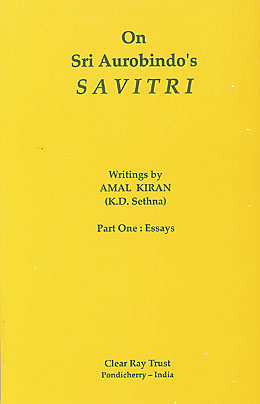 | On Sri Aurobindo's Savitri
Part One: Essays
— Writings by Amal Kiran (K. D. Sethna)
ISBN: 978-81-87916-10-9
Publisher: Clear Ray Trust, Pondicherry
Binding: Soft Cover
Pages: 368
Price: Rs 380
| This is the first volume of a two-part compilation of Amal's Kiran's writings on Savitri and consists of complete essays which have appeared as chapters or sections of books or as independent journal articles. Essays include “Letters on Savitri”, which recounts how in 1936, years before its publication, Sri Aurobindo sent the author selected lines and passages from the poem, and the 1946 article “Sri Aurobindo—A New Age of Mystical Poetry”, in which Savitri was introduced to the public for the first time. Other essays cover glimpses, reflections, and notes on the epic, discussions on Savitri in the larger context of English poetry, and studies on earlier versions of the poem. All reveal the author's deep study of Savitri and an understanding shaped and illuminated by the insights found in Sri Aurobindo's many letters to him on the subject.
|
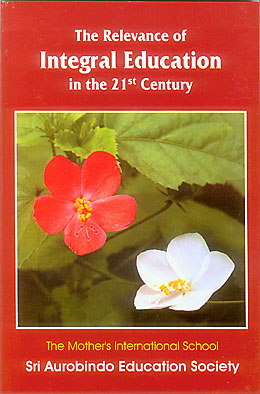 | The Relevance of Integral Education in the 21st Century
— An Anthology of Essays
ISBN: 978-81-88847-26-6
Publisher: Sri Aurobindo Education Society, New Delhi
Binding: Soft Cover
Pages: 164
Price: Rs 150
| Focused on a re-examination of the need for radical changes in education, this book is a collection of ten articles by educationists who are committed to implementing the theory of integral education as outlined by Sri Aurobindo and the Mother. While all the essays emphasise the basic principle of educating the physical, emotional, intellectual, psychic, and spiritual dimensions of the human being, some address specific methods of teaching and learning while others look at some of the challenges confronting students, teachers, and schools as they face an increasing materialism, a pervasive technological revolution, and an atmosphere of misguided zealotry.
|
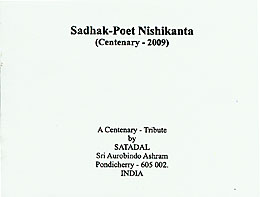 | Sadhak-Poet Nishikanta
A Centenary Tribute
— Satadal
Publisher: Sri Aurobindo Sthan, Kolkata
Binding: Soft Cover
Pages: 10
Price: Rs 10
| This booklet gives a very brief introduction to Nishikanta’s early years spent at Shantiniketan and tells the story of his search for a guru, culminating with his arrival in Pondicherry. He is remembered as an artist and an accomplished poet, whose poems in Bengali were often praised by Sri Aurobindo.
|
TAMIL |
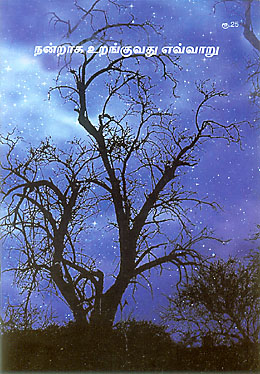 | Nanraga Uranguvathu Evvaru
— Sri Aravindar-Sri Annai Ezhuttukkallilirundhu Thogukkapattavai
ISBN: 978-81-7060-289-7
Publisher: Sri Aurobindo Society, Pondicherry
Binding: Soft Cover
Pages: 40
Price: Rs 25
|
|
GUJARATI |
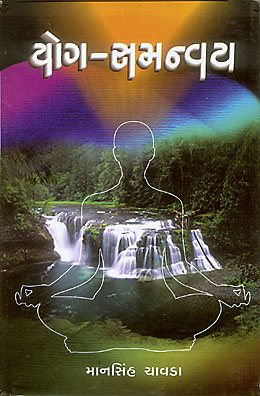 | Yog-Samanvaya
— Mansinh Chavda
Publisher: Sri Ma Sri Aurobindo Sadhana Kendra, Rajkot
Binding: Hard Cover
Pages: 272
Price: Rs 225
| The author comments on The Synthesis of Yoga by Sri Aurobindo
|
RUSSIAN |
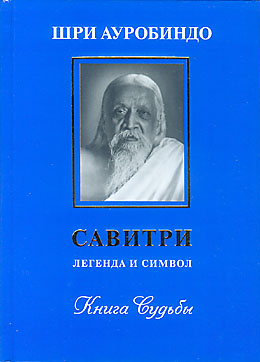 | Savitri: Legenda i Simbol (Kniga 6)
— Sri Aurobindo, perevod i kommentarii Dmitriya Melgunova
ISBN: 978-5-91258-148-9
Publisher: Savitri, St. Petersburg, Russia
Binding: Hard Cover
Pages: 432
Price: Rs 375
|
|
|